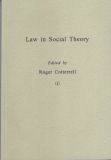用户登陆搜 索 |
查看图书
图书目录:Acknowledgements
Series Preface Introduction PART I ORIENTATIONS 1 Woffgang Schluchter (2002), 'The Sociology of Law as an Empirical Theory of Validity', Journal of Classical Sociology, 2, pp. 257-80. PART II LEGAL FORM AND LEGAL RATIONALITY: MAX WEBER'S LEGACY 2 Ronen Shamir (1993), 'Formal and Substantive Rationality in American Law: A Weberian Perspective', Social and Legal Studies, 2, pp. 45-72. 3 Wolf Heydebrand (2003), 'Process Rationality as Legal Governance: A Comparative Perspective', International Sociology, 18, pp. 325-49. 4 Harold J. Ben-nan (1987), 'Some False Premises of Max Weber's Sociology of Law', Washington Universio' Law Quarterly, 65, pp. 758-70. PART III LAW, EXPERIENCE AND BELIEF: DURKHEIM, DURKHEIMIANS AND BEYOND 5 Jack R Gibbs (2003), "A Formal Restatement of Durkheim's "Division of Labor" Theory', Sociological Theory, 21, pp. 103-27. 6 Barbara A. Misztal (2003), 'Durkheim on Collective Memory', Journal qf' Classical Sociology, 3, pp. 123-43. 7 Roger Cotterrell (2004), 'Constructing the Juristic Durkheim? Paul Huvelin's Adaptation of Durkheimian Sociology', Durkheimian Studies, 10, pp. 56-69. 8 Roger Cotterretl (2004), 'Emmanuel LEvy and Legal Studies: A View from Abroad', Droit et Socidtd, 56-57, pp. 131-41. 9 Geoffrey MacCormack (1980), 'Georges Davy and the Origin of Contract', Irish Jurist, 15, (new series), pp. 166-76. 10 Reza Banakar (2001), 'Integrating Reciprocal Perspectives: On Gurvitch's Theory of Immediate Jural Experience', Canadian Journal of Law and SocieTY , 16, pp. 67-91. PART IV LAW AS DISCOURSE, SYSTEM, FIELD: HABERMAS, LUHMANN, BOURDIEU 11 Michel Rosenfeld (1996), 'Can Rights, Democracy, and Justice be Reconciled through Discourse Theory? Reflections on Habermas's Proceduralist Paradigm of Law', Cardozo Law Review, 17, pp. 791-824. 12 Pablo De Greiff (2002), 'Habermas on Nationalism and Cosmopolitanism', Ratio Juris, 15, pp. 418-38. 13 Gunther Teubner (1996), 'De Collisione Discursuum: Communicative Rationalities in Law, Morality, and Politics', Cardozo Law Review, 17, pp. 901-18. 14 Michael King and Anton SchiJtz (1994), 'The Ambitious Modesty of Niklas Luhmann', Journal of Law and Socie~, 21, pp. 261 -87. 15 Gunther Teubner (2001), 'Economics of Gift - Positivity of Justice: The Mutual Paranoia of Jacques Derrida and Niklas Luhmann', Theory, Culture and SocieO', 18, pp. 29-47. 16 Mauricio Garcfa Villegas (2004), 'On Pierre Bourdieu!s Legal Thought', Droit et Socidtd, 56-57, pp. 57-71. PART V FOUCAULT, DISCIPLINE AND REGULATION 17 Victor Tadros (1998), 'Between Governance and Discipline: The Law and Michel Foucault', Oaford Journal of Legal Studies, 18, pp. 75-103. 18 Nancy Fraser (2003), 'From Discipline to Flexibilization? Rereading Foucault in the Shadow of Globalization', Constellations, 10, pp. 160-71. 19 Nikolas Rose (1996), 'The Death of the Social? Re -figuring the Territory of Government', Economy and SocieO', 25, pp. 327- 56. PART VI SOVEREIGNTY, GLOBALIZATION AND THE RULE OF LAW 20 Ji~i Pfibfin (2003), 'Stealing the Natural Language: The Fiction of the Social Contract and Legality in the Light of Nietzsche's Philosophy', Cardozo Law Review, 24, pp. 663-81. 21 David Dyzenhaus (1994), '"Now the Machine Runs Itself": Carl Schmitt on Hobbes and Kelsen', Cardozo Law Review, 16, pp. 1-19. 22 Martti Koskenniemi (2004), 'International Law as Political Theology: How to Read Nomos der Erde?', Constellations, 11, pp. 492-511. 23 Roger Cotterrell (1996), 'The Rule of Law in Transition: Revisiting Franz Neumann's Sociology of Legality', Social and Legal Studies, 5, pp. 451-70. 24 William E. Scheuerman (2001), 'Franz Neumann: Legal Theorist of Globalization?', Constellations, 8, pp. 503-20. Name Index |

